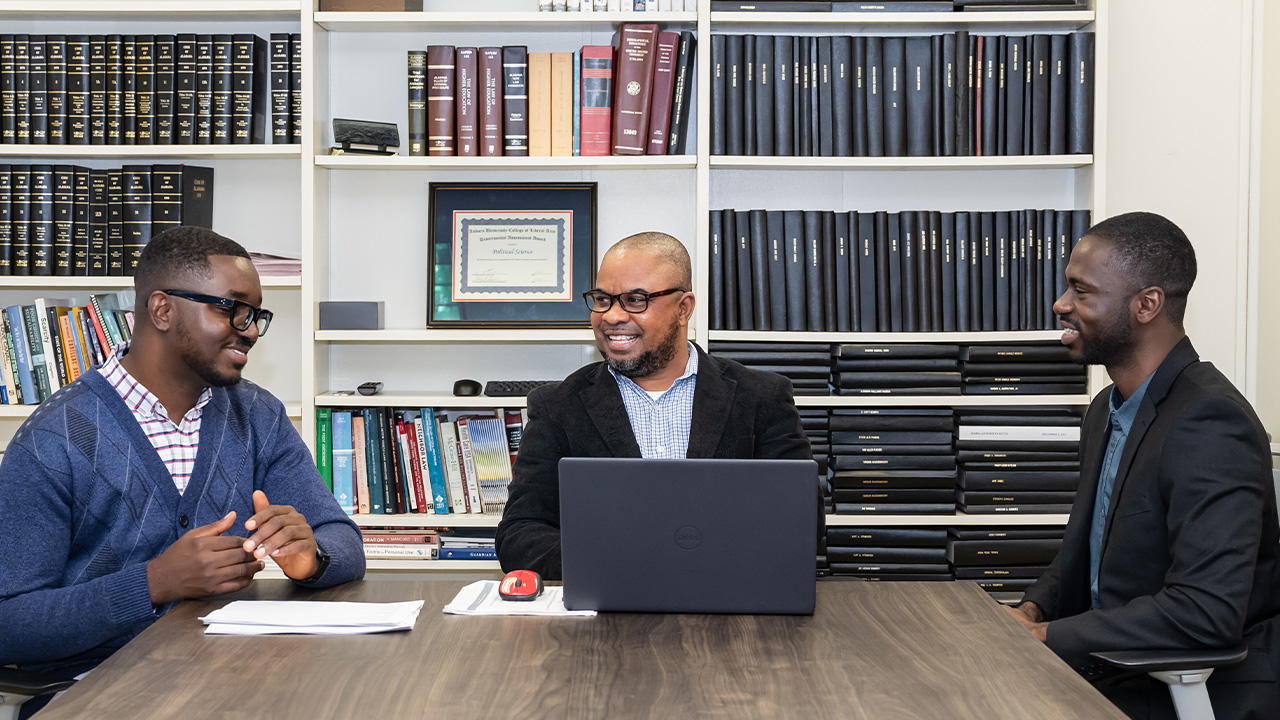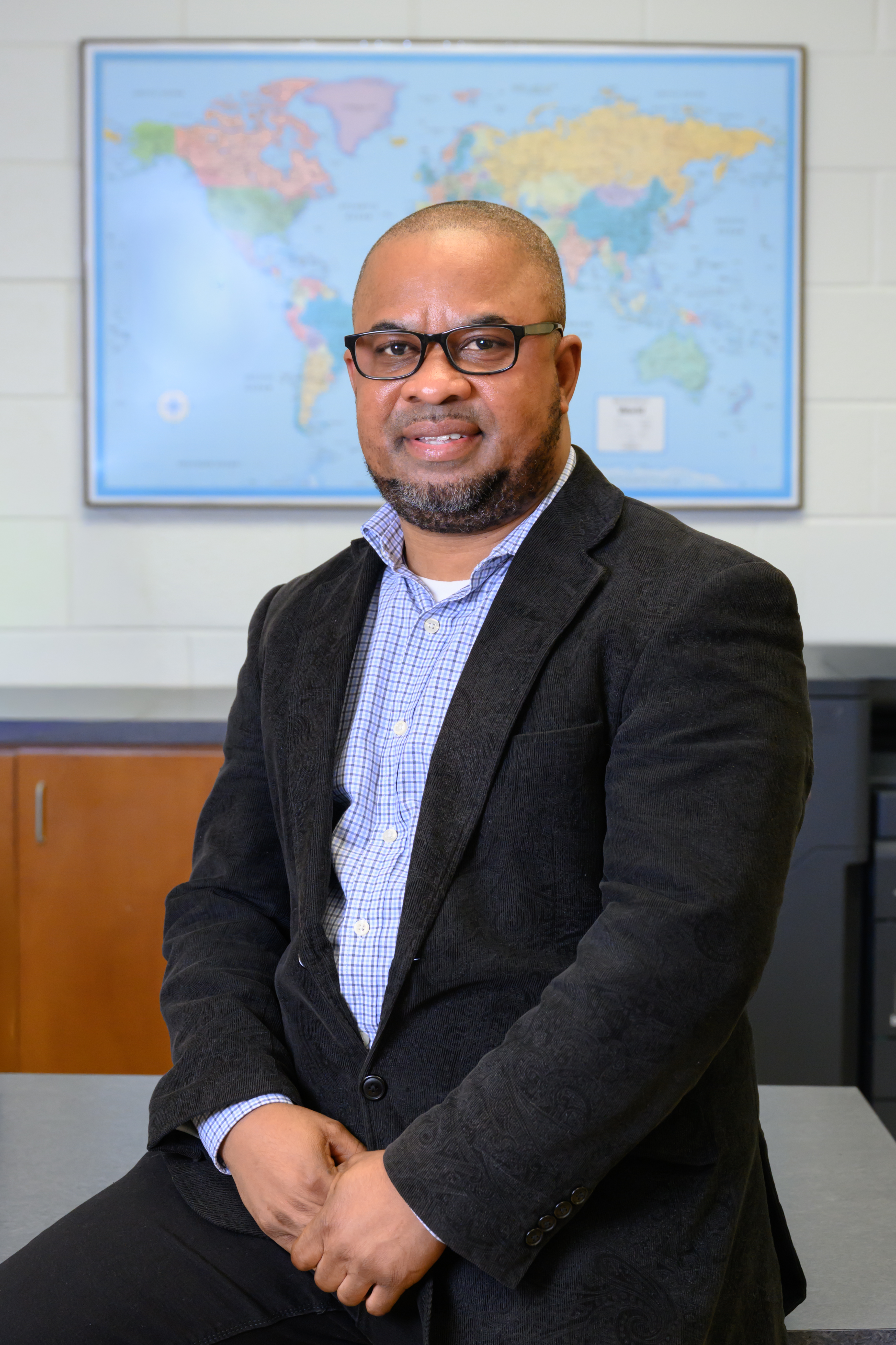content body

Duah serves as a research mentor for Nwachukwu Agwu Ani (left), originally from Nigeria, and Daniel Nii Laate, who is a native of Ghana like Duah. Both students are pursuing doctorates.
When John Duah researches and teaches students about maternal and child health and health care access, it isn’t just professional — it’s personal.
“Several years ago, I lost a family member who developed complications during pregnancy,” he said. “The systemic challenges my family has experienced led me to want to make a difference in public health.”
An assistant professor in Auburn’s Health Services Administration program, Duah has a varied background, and that means he fits right in with his colleagues; being housed in the College of Liberal Arts means the program’s faculty members have expertise in fields ranging from business, political science and public policy to health care administration and the insurance industry.
For his part, Duah’s experience spans maternal and child health, public health emergency preparedness and response, global health research and even small and large animal veterinary practice in Ghana.
“After finishing my undergraduate degree, I wanted to do something different,” he said. “I had very good professors who opened doors to experience in public health, and I’ve been very lucky.”
Africa to Alabama
Though he didn’t know it at the time, Duah’s earliest introduction to public health was witnessing the effects of a fragile health care system while growing up in the west African country of Ghana.
“Most people have negative experiences with health care providers there, so they tend to shy away from going to follow-up appointments or even trying to get care,” he said. “Often, they self-medicate or rely on traditional remedies or herbal products, and unfortunately, that can lead to complications and sometimes even preventable deaths.”
Upon arriving in the United States, Duah earned a bachelor’s degree in animal sciences at Washington State University. He soon became a naturalized citizen, learned about the field of public health and went on to earn three more degrees: a Master of Public Health, a master’s degree in emergency management and homeland security and a Doctor of Health Administration.

Like the multidisciplinary program he works in, Duah’s areas of research are diverse, ranging from measles in Somalia and Tuberculosis in Sierra Leone to smoking, substance use and prenatal care barriers in Alabama.
“I didn’t know I was going to stay in the U.S.; I was just trying to get my education and go back,” he said. “But focusing on public health gave me a pathway to influence both policy and practice.”
In his professional work, he developed expertise in infectious disease, perinatal epidemiology and cross-border threats. He was soon recruited to work on a $9.8 million grant-funded project in San Antonio to address pregnant women and infant mortality.
After earning his doctorate from Central Michigan University, Duah joined the Auburn faculty, teaching management principles, leadership styles and how health care systems prepare for and respond to public health emergencies in the face of risks like infectious disease.
“The students in our program are very academically prepared and engaged,” he said. “It’s fun to bring practical experience into the classroom and share what is happening in the real world, and they seem to appreciate that.”
Some health services administration students have a strong foundation in science, while others have more knowledge of the social sciences, and Duah appreciates that variety.
“We understand that people come from different backgrounds, so you have to find out where your students are and adapt to their skills and interests,” he said. “For us, it’s not just coming to class, teaching one thing and then saying goodbye until next time; we keep our office doors open.”
Research around the globe
Like the multidisciplinary program he works in, Duah’s areas of research are diverse, ranging from measles in Somalia and Tuberculosis in Sierra Leone to smoking, substance use and prenatal care barriers in Alabama. When travel to Africa isn’t possible, Duah relies on his contacts on the ground in Ghana to help him access the data he needs.
“I’m able to partner with local health departments and medical providers, most of whom I grew up with, who operate clinics back home,” he said. “I share my work with them, and they can disseminate and apply that work in their practice.”
Duah hopes to see his research employed to improve health care systems across the globe. Similarly, he encourages his students to find areas of research they’re passionate about by connecting with faculty members.
“Research is not just about data alone; it’s also about curiosity and your ability to make a difference,” he said. “I tell my students not to shy away from getting involved. If you show an interest in something, you never know where it will take you.”
And just as his professors did for him as an undergraduate, Duah tries to introduce his students to new experiences, whether that’s research, graduate school or applying for jobs. Teaching at Auburn is his way of giving back, and he wouldn’t change a thing.
“I try to create a classroom environment where students can open up and contribute,” he said. “I have no regrets about leaving practice to teach. I’d do it 100 times over again.”




